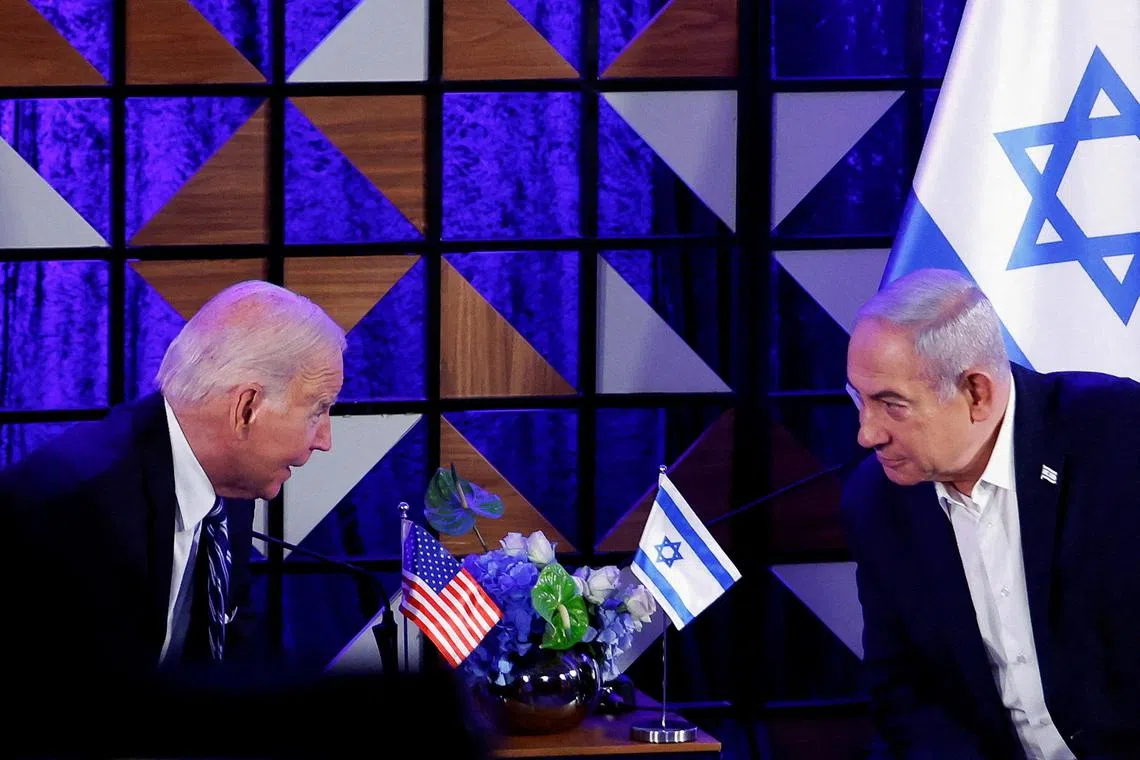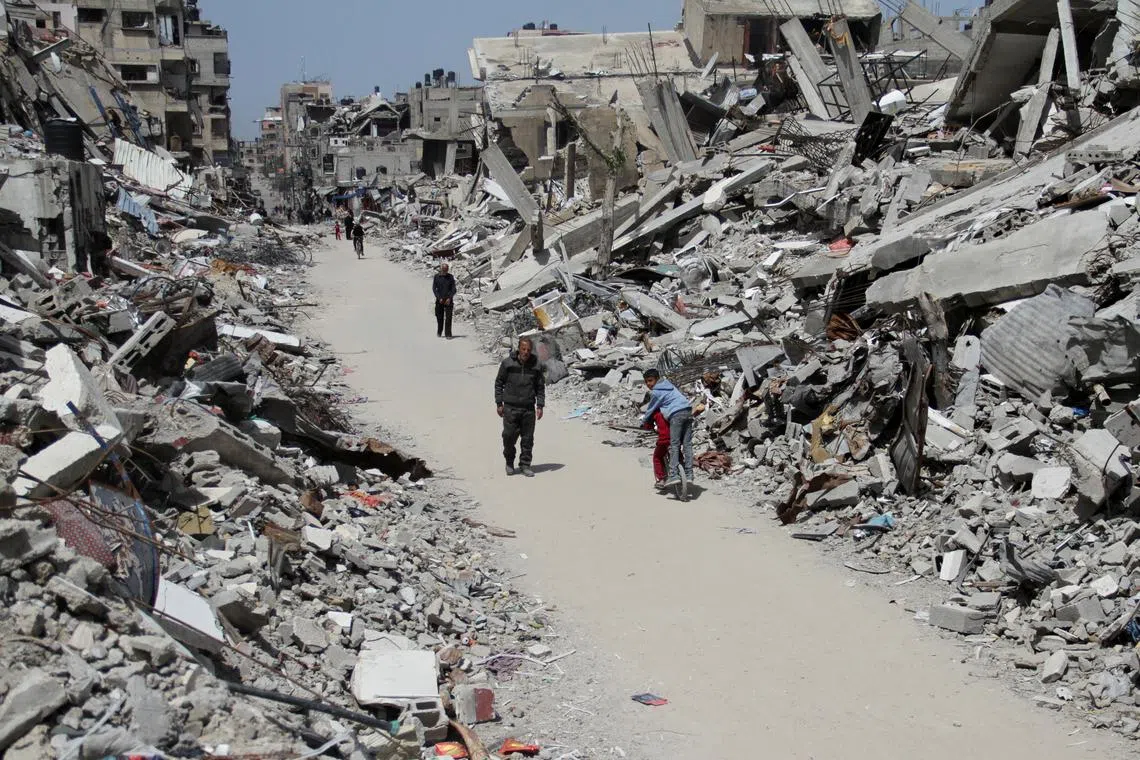Biden ultimatum to Netanyahu: Protect Gaza civilians, or else
Sign up now: Get ST's newsletters delivered to your inbox

US President Joe Biden (left) with Israeli Prime Minister Benjamin Netanyahu during a meeting in Tel Aviv, Israel, on Oct 18, 2023.
PHOTO: REUTERS
WASHINGTON - US President Joe Biden effectively gave Israeli Prime Minister Benjamin Netanyahu an ultimatum on April 4: Protect Palestinian civilians and foreign aid workers in Gaza, or Washington could rein in support for Israel in its war against Hamas militants.
The message, after months of US calls for Israel to change its military tactics that have killed tens of thousands of Palestinians, followed an Israeli attack that killed seven World Central Kitchen (WCK) aid workers
Israel admits the strike was a mistake.
Senior Israeli military officials on April 5 pinned it on a series of failures, including a breakdown in communication and violations of the rules of engagement.
They said two officers who ordered the air strikes on the WCK convoy – a colonel and a major – have been dismissed from their positions. The military also formally reprimanded senior officers, including the general at the head of the Southern Command.
The case was also handed over to the military advocate general to consider a possible criminal investigation, the military said.
“The strike on the aid vehicles is a grave mistake stemming from a serious failure due to a mistaken identification, errors in decision-making and an attack contrary to the standard operating procedures,” the Israeli military said in a statement issued on April 5.
The White House did not say exactly what steps it wanted Mr Netanyahu to take, nor what it would do if he failed to take them. But analysts said the implicit threat was to slow US arms transfers to Israel or to temper US support at the United Nations.
“This is as close to a ‘come to Jesus’ moment as you can get,” said analyst Steven Cook of the Council on Foreign Relations think-tank, referring to Mr Biden’s comment in March that he and Mr Netanyahu were heading for such a turning point.
Mr Dennis Ross, a veteran US diplomat now at the Washington Institute for Near East Policy said: “The President, in effect, is saying meet these humanitarian needs or I will have no choice but to condition (military) assistance.”
Mr Biden, up for re-election in November, has struggled to balance pressure to rein in Mr Netanyahu from progressive Democrats, dismayed at the Palestinian civilian death toll, against the risk of alienating mostly pro-Israel independent voters. He has so far resisted setting conditions on arms transfers.
The war began after Hamas’ Oct 7 attack on Israel killed 1,200 people,
More than 33,000 Palestinians have died, according to the Health Ministry in Hamas-ruled Gaza, of whom most were women and children. Israel accuses Hamas of using civilians as human shields.
Describing their call, the White House said Mr Biden called for Israel “to announce and implement a series of specific, concrete and measurable steps to address civilian harm, humanitarian suffering and the safety of aid workers”.
“He made clear that US policy with respect to Gaza will be determined by our assessment of Israel’s immediate action on these steps,” the White House added in a statement.
US Secretary of State Antony Blinken was more blunt. “Look, I’ll just say this: If we don’t see the changes that we need to see, there will be changes in our policy,” he said.
On the evening of April 4, just hours after the call, the Israeli government announced several steps to increase aid flows to Gaza, including opening the Ashdod port and the Erez crossing into northern Gaza and increasing aid deliveries from Jordan. It was not clear if the steps would be enough to satisfy US demands.
In response, the US said it welcomes Israel’s latest efforts to allow more humanitarian aid into Gaza, but that success would be measured in results in improving the situation on the ground.
“Really the proof is in the results, and we will see those unfold in the coming days, in the coming weeks,” Mr Blinken said.
Asked on Israel’s action after Mr Biden’s shift in position, Mr Blinken told journalists that Washington would be “closely looking” at specific metrics such as the number of trucks making their way into the Gaza Strip and the evolution of famine risks.
He also said Israel needed to make sure the population is protected from its strikes by “maximising every effort to protect civilians”, adding: “We just can’t have so many people caught in the crossfire, killed, injured, going forward.”
UN Secretary-General Antonio Guterres said on April 5 that he sincerely hopes Israel quickly and effectively boosts aid access to Gaza, describing the situation there as “absolutely desperate”.
“When the gates to aid are closed, the doors to starvation are opened. More than half the population – over a million people – are facing catastrophic hunger. Children in Gaza today are dying from lack of food and water,” he told reporters.
“This is incomprehensible, and entirely avoidable,” he said. “Nothing can justify the collective punishment of the Palestinian people.”
Turning point
The turning point for Mr Biden, an ardent supporter of Israel, was the deadly Israeli attack on April 1 on the workers from celebrity chef Jose Andres’ WCK charity group.
The UN Human Rights Office’s spokesman Jeremy Laurence on April 5 said the air strike “may amount to a war crime”.
The attack came as the Biden administration has been stepping up pressure on Israel to consider alternatives to a threatened ground offensive in the southern Gaza city of Rafah, the last relatively safe haven for civilians in the coastal enclave.
Speaking on condition of anonymity, a source familiar with the talks said the 30-minute call was at times tense, with Mr Biden spelling out his concerns and Mr Netanyahu defending his approach to Gaza.
A senior White House official described the conversation as “very direct, very straightforward”, saying it included Vice-President Kamala Harris, National Security Adviser Jake Sullivan and Mr Blinken.
As to what the US expects, the official said: “We need a comprehensive plan on them doing a much better job here. They can’t be killing humanitarian aid workers and civilians.”

More than 33,000 Palestinians have died, according to the Health Ministry in Hamas-ruled Gaza, of whom most were women and children.
PHOTO: REUTERS
While Mr Biden has long avoided curtailing US support for Israel, he may finally have reached his limit.
“There was always going to be a point at which the Biden administration felt that the domestic and international cost of supporting Israel’s campaign in Gaza outweighed the benefit of what Israel was able to achieve on the ground,” said Mr Mike Singh, a former National Security Council official on the Middle East.
“What is remarkable is not that this is happening but that it took so long.”
Mr Singh, now at the Washington Institute for Near East Policy, said if Israel did not meet Mr Biden's conditions, the likeliest step was the US negotiating a UN Security Council resolution like the one that ended the 2006 Israel-Hezbollah conflict.
“Placing conditions on arms transfers is more fraught politically, would likely face stiff opposition on (Capitol) Hill, and could leave Israel vulnerable to attack by Hezbollah or other Iranian proxies,” he added.
Still, Mr Biden may have telegraphed his thinking in March when, after saying a Rafah invasion would be a “red line”,
He did not explicitly make such assurances about offensive weapons, fuelling speculation he could impose conditions on such arms transfers to Israel, which relies heavily on US arms.
Mr Jonathan Panikoff, a former deputy national intelligence officer on the Middle East, said Mr Biden was unlikely to take drastic action upending US-Israeli ties, such as withholding big-ticket weapons or completely abandoning Israel at the UN.
But he could put conditions on smaller military items and take further measures against extremist Jewish settlers involved in attacks on Palestinians in the occupied West Bank.
“Biden’s frustration with how the war is being conducted, and with Prime Minister Netanyahu himself, has reached an apex,” Mr Panikoff said. REUTERS


